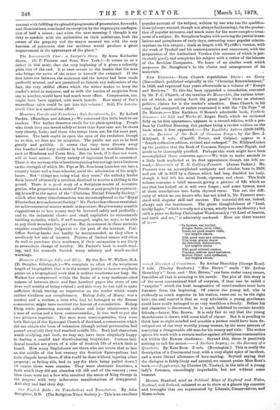NEW Enmoxs.—Dean Church republishes Dante : an Essay (Macmillan), published
originally in the "Christian Remembrancer," in 1850, and reprinted four years afterwards in a volume of "Essays and Reviews." To this has been appended a translation, executed by Mr. F. C. Church, of the treatise De Monarchia, the curious inter- est of which, as setting forth the great poet's views on abstract politics, claims for it the reader's attention. Dean Church, in his essay, had compared, or rather contrasted it with the "Du Papa" of Be Maistre.—Miss Kathleen O'Meara's admirable book, Frederic Ozanam: his Life and Works (C. Began Paul), which we reviewed fully on its first appearance, appears in a second edition, with a pre- face by Cardinal Manning, this preface being a review written on the book when it first appeared.—The Ingoldsby Letters (1858-1878), on the Revision of the Book of Common Prayer, by the Rev. J. Hildyard, 2 vols. (Cassell, Petter, and Galpin), appear in a "fourth collective edition, revised and enlarged." Dr. Hildyard takes up the position that the Book of Common Prayer is semi-Popish, and needs to be thoroughly purified. Perhaps this work might have been accomplished three centuries ago.—We wish to make amends to a little book neglected at its first appearance, though not left un- read,—Memorials of T. G. Goclfrey-Faussett. (James Parker.) Mr. Fuussett was an accomplished antiquary and scholar, born in 1829, and cut off in 1877 by a disease which had long disabled his body, though it had left his mind fresh, vigorous, and clear. This little volume contains a brief memoir, giving a picture of life which no one that has looked on it will ever forget ; and some hymns, most of them translations into Latin rhymed verse. This art, the diffi- culty of which no one knows who has not tried it, Mr. Faussett exer- cised with singular skill and success. The material did not, indeed, always suit the instrument. The grave thoughtfulness of "Lead, kindly Light," which is really not a hymn, wholly loses its identity ; but such a piece as Bishop Christopher Wordsworth's "0 Lord of heaven, and earth and sea," is admirably rendered. Here are three stanzas of it :—
" Te favente, ver renidet, Frnges, Sores, terra videt ; Tuum sot quod messts ridet, Qui largiris omnia.
Tibi, (pod stint pax salusque. Vita bona, grates usque En debemus, dabimusque, Qui largiris mats.
Tibi, quod redemti stamus, ftratiam, eaelum quod speramus, Rursus, Pater, quid reddamus, Qui largiris mania."
—A. Marriage of Conscience. By Arthur Sketchley (George Rose). 3 vols. (Tinsley Brothers.) "Mrs. Brown" made "Mr. Arthur Sketchley's " fame, and "Mrs. Brown," one form under many names, furnishes all that is amusing in his novels. The plot of this story is of the most conventional kind of surprise, if that can be called a " surprise " which the least imaginative of novel-readers must have foreseen from the beginning. Of course the young lad, who is evidently so much superior to his station, turns out to be the right heir; the real marvel is that so very admirable a young gentleman could have really belonged to so very worthless a family. Before his real character is discovered, he is much indebted to certain humble friends,—hence, Mrs. Brown. It is only fair to say that the young Marchioness is drawn with some kind of vigour. But it is puzzling to think how so right-minded and sensible a person could have been de- veloped out of the very worldly young woman, by the mere process of marrying a disagreeable old man for his money and title. The writer spices his work with a certain malice against all religious communities not within the Roman obedience. Beyond this, there is positively nothing to call for notice.—A Sicilian Legacy ; or, the Journey of a Quartette. By Kate Ross. 2 vols. (Remington.) This is really the description of a Continental tour, with a very slight spice of incident, and a more liberal allowance of love-making. Beyond saying that the dialogue is fairly lively and natural, we cannot praise Miss Ross's book.—Poppleivags, by Chrome (S. Tinsley), is the tale of a young lady's fortunes, exceedingly improbable, but not without some humour.
Messrs. Stanford send us Political Maps of England and Wales, Scotland, and Ireland, coloured so as to show at a glance the: counties and boroughs that are represented by Liberals, Conservatives, and Home-rulers.


































 Previous page
Previous page